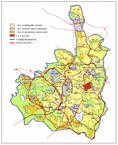sprawl open spaces citizenship globalization city climate change historic centers simulation summer schools ecology public policies technology knowledge infrastructures demography sustainability culture Environment progetto urbano landscape ifau2018 Communication immigration fabrication premio tesi di laurea
Mapping communities and social problems
in Jerusalem.
Demografic trends, neighbourhood identities
and clashing narratives
Claudia De Martino
Jerusalem is neither holy nor ordinary city. It is difficult to understand how such a contested space, where different legitimizations and narratives are continuously involved and at odds with each other, might be rhetorically assumed as a symbol of peace and coexistence. To all visitors coming first to the city it is clearly visible that Jerusalem is neither heaven on earth nor any especially spiritual place, where all of a sudden human historical or philosophical dilemma will set at rest and find an answer. On the contrary, most probably visitors might walk out of the city more confused and wretched than they stepped in. Exploring the Old City and all its monumental alleys, full of history and diverging memories, foreigners, tourists or whatever the goal of the journey, will come up with the feeling that human beings are complex creatures, difficult to understand in-depth, while even more difficult is to grasp the hidden and ideal motivations of their actions.
"The paper will consist on excursus and introduction to the different communities, historically shaped and currently living in the city, which bestow a collective identity and a specific narrative to the neighborhood they inhabit. The analysis of the way and understanding of the city by its various residents will show the complexity of the open problems and questions still facing the city. It will try to convey the main cleavages of the city which combine practical socio-economic aspects with community cultural and religious expectations, while at the same time interplaying with broader military and security aspects that go beyond the city and its management to point and reveal their connection to the yet unsolved Arab-Israeli conflict."
"The purpose is so demythologizing Jerusalem as a “community of destiny”, while the groups that are living the city do not share any of the premises that traditionally bring people together. I would finally remark on the role play by projects of modernization- of transports, services and communications- that point to the development of the city through a certain degree of normalization, which, however, tend implicitly to minimize or deny the existence of an open conflict, while suggesting that technical means and productivity might autonomously be able to deliver major changes both in space and in the hearts and minds of the people."
Claudia De Martino
Ricercatrice presso UNIMED Unione delle Università del Mediterraneo
Dottoranda in Storia Sociale del Mediterraneo presso l'Università Ca' Foscari di Venezia
Related articles:




Planum
The Journal of Urbanism
ISSN 1723-0993
owned by
Istituto Nazionale di Urbanistica
published by
Planum Association
ISSN 1723-0993 | Registered at Court of Rome 4/12/2001, num. 514/2001
Web site realized by ChannelWeb & Planum Association | Powered by BEdita 3

